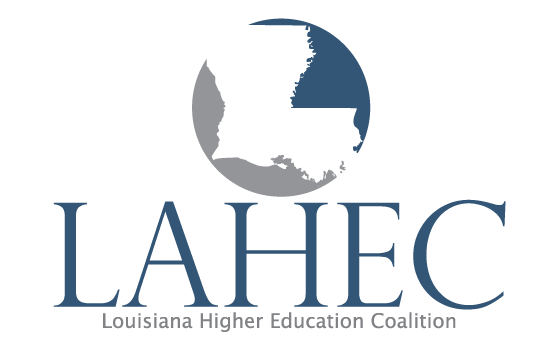
2024 LaHEC Annual Professional Development Summit
May 22-23, 2024
Pennington Biomedical Research Center
Agenda
Wednesday, May 22
| Time | Event Session/Description |
| 8:00 AM - 9:00 AM | Networking Breakfast and Check-In |
| 9:00 AM - 9:15 AM | Welcome and Conference Logistics Dr. Allison Smith, Assistant Commissioner for Student Health and Wellness, Louisiana Board of Regents |
|
Opening Remarks Dr. Kim Hunter Reed, Commissioner of Higher Education, Louisiana Board of Regents | |
| Remarks from the Louisiana Department of Health - Office of Behavioral Health Dr. Leslie Brougham Freeman, Director of Prevention, Wellness and Workplace Development | |
| 9:15 AM - 10:45 AM | Student-Athlete Mental Health: NCAA Research and Resources Carey Wheelhouse, Director of Health Promotion - Sport Science Institute, National Collegiate Athletic Association (NCAA) |
| 10:45 AM - 11:00 AM | BREAK |
| 11:00 AM - 12:15 PM | Using Peers to Reach an Insular High-Risk Population Brenda Young, Assistant Director of Student Health Promotion and Prevention, Arizona State University Deana Garner, Senior Associate Athletics Director, Arizona State University Roberta Rabelo, Student-Athlete of Sun Devil Athletics Women’s Volleyball Team, Arizona State University |
| 12:15 PM - 1:00 PM | LUNCH |
| 1:00 PM - 2:15 PM | Conceptualized Models for Engagement and Readiness in Higher Learning Constructs Dr. Monteic A. Sizer, Executive Director, Northeast Delta Human Services Authority Dr. Avius Carroll, Prevention and Wellness Director, Northeast Delta Human Services Authority Kara Jackson Etienne, Mental Health Program Director, Northeast Delta Human Services Authority |
| 2:15 PM - 2:30 PM | BREAK |
| 2:30 PM - 3:45 PM | Harm Reduction in the Collegiate Setting: From BASICS to Testing Strips Sydney Cheifetz, MPH, Assistant Director of SAFE Campuses, SAFE Project (Stop the Addiction Fatality Epidemic) Dylan Dunn, Assistant Director of SAFE Campuses, SAFE Project (Stop the Addiction Fatality Epidemic) |
| 3:45 PM - 4:00 PM | Day 1 Closing Remarks Alysia Delone, Program Manager for Student Health and Wellness, Louisiana Board of Regents |
Thursday, May 23
| Time | Event Session/Description |
| 7:45 AM - 8:30 AM | Networking Breakfast |
| 8:30 AM - 10:00 AM | Metrics, KPIs, and SMART Goals for College Student Mental Health: Making an Impact with Informatics Dr. Lindsey Mortenson, MD, MS, Executive Director University of Michigan University Health & Counseling Service Student Life Chief Mental Health Officer |
| 10:00 AM - 10:15 AM | BREAK |
| 10:15 AM - 11:45 AM | An Introduction to Collegiate Recovery Programs: Funding, Structure, and Impact & Louisiana Collegiate Recovery Program (CRP) Round Robin Kristina Canfield, Executive Director, Association of Recovery in Higher Education (ARHE) Dr. Coleen Speed, Director of Student Counseling Services, Grambling State University Kimberly Decker, Director of Collegiate Recovery, Southern University Law Center Elizabeth Froeba, Director of the Office of Accessibility and Mental Health, Northshore Technical Community College Adam Singer, Collegiate Recovery Program Manager, Louisiana State University Jacob Goldberg, Director of Recovery Programs, Tulane University Bryan Sadler, LION UP Recovery Coordinator, Southeastern Louisiana University Annette Newton-Baldwin, Assistant Director of LION UP Recovery Program and Intervention, Southeastern Louisiana University |
| 11:45 AM - 12:30 PM | LUNCH |
| 12:30 PM - 1:45 PM | Mental Health and Basic Needs: Overlapping Needs and Collaborative Solutions Dr. Stacy J. Priniski, Assistant Research Professor in the Lewis Katz School of Medicine Senior Evaluation Associate, The Hope Center for College, Community and Justice Temple University |
| 1:45 PM - 2:00 PM | Evaluations and Summit Closing Remarks Dr. Allison Smith, Assistant Commissioner for Student Health and Wellness, Louisiana Board of Regents |
Session Descriptions
-
Session 1: Student-Athlete Mental Health: NCAA Research and Resources
In this session, Dr. Carey Wheelhouse will highlight student-athlete mental health and substance use trends from the 2023 NCAA Student-Athlete Health and Wellness Study, as well as discuss updates to the NCAA Mental Health Best Practices: Understanding and Supporting Student-Athlete Mental Health, Second Edition. The NCAA Mental Health Best Practices, Second Edition, is an inter-association consensus document that provides Association-wide guidance and recommendations for supporting student-athlete mental health. The Mental Health Best Practices, Second Edition, was developed in collaboration with the NCAA Committee for Competitive Safeguards and Medical Aspects of Sports, reflects the core consensus of the NCAA Mental Health Advisory Group, and is recognized in Association-wide legislation.
-
Session 2: Using Peers to Reach an Insular High-Risk Population
Brenda Young, Deana Garner, and Mya Wheeler are to share how a Health Promotion and Prevention Team leveraged resources to build a peer health education program within an athletic community in efforts to reduce substance misuse. The current program was developed under the principles of Alexander Astin who wrote the theory of Student Involvement. Led by peer educators from this high-risk population, content has been tailored to meet the unique needs of this target group and has led to the creation of peer-to-peer connections that drive overall student well-being and group affinity.
-
Session 3: Conceptualized Models for Engagement and Readiness in Higher Learning Constructs
Dr. Monteic Sizer, Dr. Avius Carroll, and Kara Etienne will share how traditional CSAP approaches have been proven to delay or curtail negative behaviors associated with the early use of alcohol, tobacco, and other drugs. The use of evidenced-school and community-based programs in northeast Louisiana is becoming increasingly successful with the integration of community wellness initiatives, extensive outreach programming and coordination with behavioral health interventions, and intentional collaboration with institutions, systems, and organizations. This session will talk about how integrated healthcare models functioning within wellness concepts create better prevention outcomes for communities, including tailored efforts for targeted populations such as colleges and universities. We will discuss how wellness, recovery, and outreach play an integral role in bridging gaps in the prevention model, along with shared stories of successful wellness events and how each initiative created an opportunity to explore avenues to expand our prevention efforts and create sustainable partnerships with institutions of higher learning. This interactive session will help participants create a roadmap for their community and participate in conversations on best practices.
-
Session 4: Harm Reduction in the Collegiate Setting: From BASICS to Testing Strips
Every year, over 80,000 people die from an opioid overdose in the United States. Stigma is continuously found to be one of the biggest barriers between people who use drugs and the treatment and support they deserve. While institutions of higher education are often seen as places where we create and develop the future leaders of our nation, too often campuses are unprepared to prevent and reverse overdoses, and stigma continues to be insidious. Even when professionals and students feel ready to implement solutions, they are often unsure where to start. In this session, presenters will lead discussions about harm reduction tools such as naloxone and testing strips, how to implement them, and the misinformation that commonly gets in the way. Participants will receive current information and resources to support life-saving efforts on their campus and in their communities.
-
Session 5: Metrics, KPIs, and SMART Goals for College Student Mental Health: Making an Impact with Informatics
“In order to improve something, you need to measure it.” This idea is central to quality improvement (Institute for Healthcare Improvement). However, measuring mental health and mental well-being is challenged by semantic differences and a lack of universally agreed-upon standards and outcomes. Fortunately, there are established frameworks, research, measures, and SMART (specific, measurable, achievable, relevant, time-bound) goals that college health professionals can anchor to and adapt in order to make a positive impact on their campus. In this session, Dr. Lindsey Mortenson will describe one university’s experience with identifying metrics that have moved the needle on the student experience and mental well-being.
-
Session 6: Mental Health and Basic Needs: Overlapping Needs and Collaborative Solutions
Students are humans first, and basic needs security (stable and adequate food, housing, mental health, childcare, transportation, etc.) is a critical, foundational requirement for student learning, success, and degree completion. In this session, Dr. Stacy J. Priniski will provide an overview of the basic needs landscape using data from The Hope Center’s Student Basic Needs Survey, with a particular focus on the interplay of mental health needs and other basic needs. We will discuss promising practices and policy opportunities to support students’ basic needs as an upstream approach to improving mental health. Collaborative solutions to improve mental health and basic needs allow institutions to support the whole student.
-
Session 7: An Introduction to Collegiate Recovery Programs: Funding, Structure & Impact and Louisiana Collegiate Recovery Program (CRP) Round Robin
The need for a continuum of care on campus is critical for getting students the help they need for long-term recovery. Collegiate Recovery Programs (CRPs) are designed to provide recovery support services within the college environment. With this support, students are given the opportunity to maintain recovery and thrive while succeeding in college. In this session, Kristina Canfield will explore the rich history of collegiate recovery programs, and their vital role as part of campus services, and demonstrate the cost-effectiveness of supporting one of these programs on your campus.
Followed by the presentation from Kristina Canfield, attendees will hear from each of Louisiana’s six (6) CRPs: Dr. Coleen Speed of Grambling State University, Kimberly Decker of Southern University Law Center, Elizabeth Froeba of Northshore Technical Community College, Adam Singer of Louisiana State University, Jacob Goldberg of Tulane University, and Bryan Sadler & Annette Baldwin of Southeastern Louisiana University.
